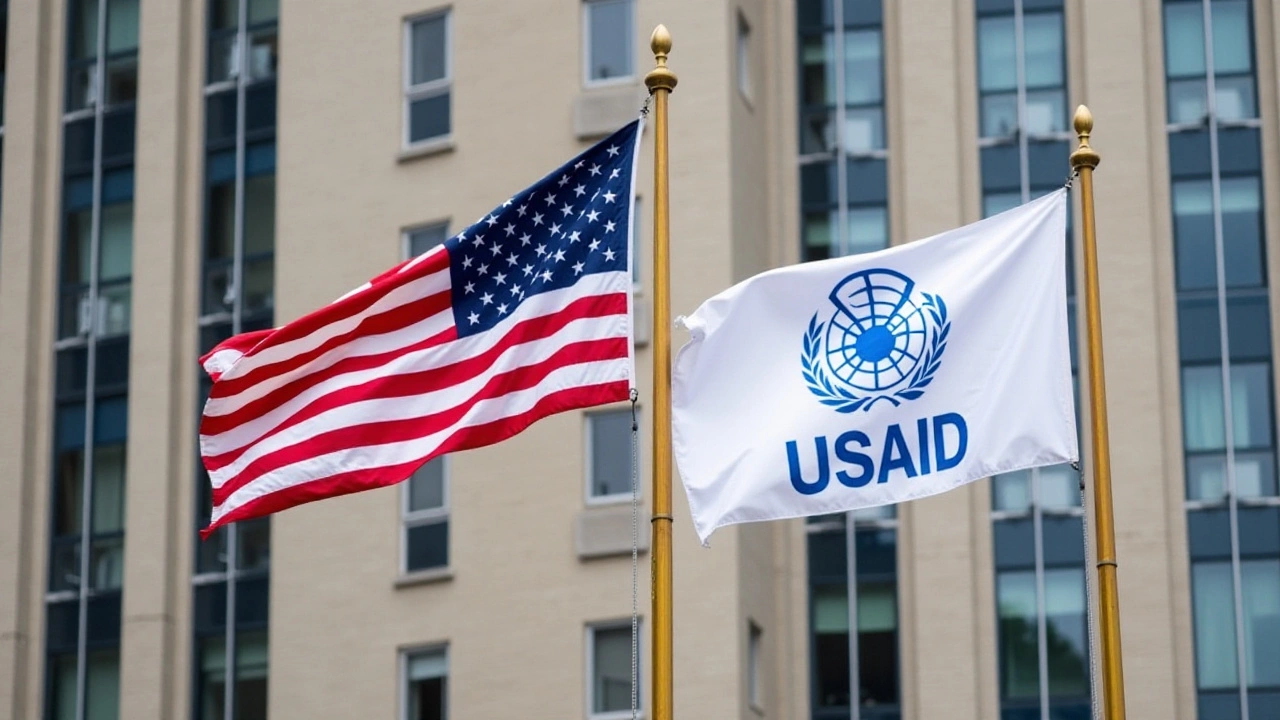USAID Website Taken Offline Amid Controversial Trump Administration Foreign Aid Reductions
 Feb, 2 2025
Feb, 2 2025
USAID Faces Uncertainty and Disruption Amid Trump's Foreign Aid Revision
The United States Agency for International Development (USAID), a cornerstone entity responsible for administering civilian foreign aid and development assistance, finds itself at a crossroads. The agency's website recently went offline, mirroring the confusion and chaos unfolding behind the scenes as the Trump administration initiates sweeping changes aimed at slashing foreign assistance and potentially restructuring USAID under the oversight of the State Department.
Workforce Tensions as Layoffs and Furloughs Surge
USAID employees are reportedly grappling with mounting stress and anxiety as seismic changes rock their working environment. As the signature blue and white website of USAID vanished from the web, a palpable uncertainty took hold within the agency's ranks. Anonymous insiders have shared that, distressingly, within a single week, almost half of the workforce faced furloughs or were laid off, a stark indicator of the depth of the reformation underway. This abrupt and sweeping downsizing has fueled fears that the agency is not merely restructuring but could be facing a significant downsizing, or potentially, dismantling.
Compounding these concerns, the introduction of an artificial intelligence (AI) program intended to monitor email communications has done little to ease tensions. Employees are warily eyeing the Department of Government Efficiency, headed by Elon Musk, which is behind the oversight technology. This AI system introduces an era of increased scrutiny and oversight, leaving the remaining workforce skeptical about their autonomy and privacy within a federally guided role.
A Shift to the State Department: Implications and Interpretations
The unforeseen transfer of USAID's online presence to the State Department's domain raises important questions about the future scope and independence of USAID. Historically, USAID has functioned with a degree of autonomy, enabling it to implement nuanced and effective aid programs globally. However, being repositioned under the State Department's umbrella might signal a consolidation that aligns USAID's objectives more closely with United States foreign policy priorities, as defined by the Trump administration.
This potential realignment could herald a prioritization of short-term strategic goals over the traditional long-term development missions that have earned USAID a reputation for fostering stable, prosperous societies internationally. This perceived shift is not without its critics, both inside and outside the federal workforce, who argue that reducing USAID's maneuverability and implementing sweeping aid cuts could undermine longstanding partnerships and development efforts, which bear significance for global and domestic security.
Political Opposition: A Clash Over Authority and Strategy
While this pivot in policy, characterized by substantial fiscal cuts to foreign aid, stands out as a hallmark initiative under the Trump administration, it is not without its contentious elements and opposition. Key lawmakers, including Democratic Senators Chris Coons and Chris Murphy, have openly challenged the executive's authority to unilaterally decide on altering the fundamental framework of USAID, a body established through Congressional mandates. These senators posit that, strategically, the withdrawal of US foreign aid any further could present geostrategic opportunities for rival countries, such as India, Russia, and China, to step into the breach left by diminished American influence.
Reflecting on the international implications, these lawmakers express anxiety that reduced US engagement abroad can weaken economic and diplomatic ties, lending adversaries an opening to expand their influence in regions of strategic interest critical to American security imperatives. This could mean diminished soft power alliances, less leverage in international negotiations, and consequently, potentially more adverse outcomes for US interests overseas.
The Unknown Road Ahead for USAID and US Foreign Aid
As the Trump administration forges ahead with plans to transform USAID’s trajectory, significant uncertainty lingers. For employees, the pathway is fraught with challenges as they navigate an increasingly unpredictable landscape, where job security and the essence of their mission remain in question. Simultaneously, on a broader scale, these changes are forcing a reevaluation of how the US envisions its role in global development and diplomacy — a process fraught with ideological and political divides.
Within the storied halls of the US government, discussions swirl about how best to protect America's interests while upholding its image and efficacy as a leader in global aid. As debates about the propriety and safety of foreign aid cuts echo through the corridors of power, the dialogue remains fierce. The outcome of these shifts may redefine not only USAID's mission but also America's broader humanitarian and global stature, casting ripples across international development landscapes traditionally supported and led by US policy.
The implications of these changes, while deeply felt now, may only fully reveal themselves in the years to come as the consequences of these current decisions unwind. For now, the facts on the ground continue to develop, with stakeholders within USAID, the State Department, and Congress vigilantly monitoring each step in this unfolding saga.

Derek Pholms
February 4, 2025 AT 11:08Irigi Arun kumar
February 5, 2025 AT 06:52Jeyaprakash Gopalswamy
February 6, 2025 AT 01:00ajinkya Ingulkar
February 7, 2025 AT 21:06nidhi heda
February 8, 2025 AT 23:33DINESH BAJAJ
February 10, 2025 AT 03:45Rohit Raina
February 10, 2025 AT 19:15Prasad Dhumane
February 11, 2025 AT 22:55rajesh gorai
February 13, 2025 AT 20:43Rampravesh Singh
February 14, 2025 AT 22:41Akul Saini
February 16, 2025 AT 08:14Arvind Singh Chauhan
February 16, 2025 AT 12:46AAMITESH BANERJEE
February 16, 2025 AT 13:44Akshat Umrao
February 17, 2025 AT 08:19Sonu Kumar
February 17, 2025 AT 20:12sunil kumar
February 17, 2025 AT 20:34musa dogan
February 19, 2025 AT 17:59Mark Dodak
February 20, 2025 AT 20:10Jason Lo
February 21, 2025 AT 02:36Brian Gallagher
February 21, 2025 AT 06:26